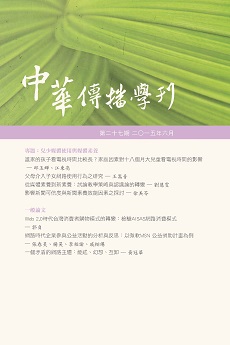 閱覽人數: 2695
閱覽人數: 2695
June
2015
No. 27
兒少媒體使用與媒體素養
Young Adolescent Media Use and Media Literacy頁數:37 - 65
作者(中)
王嵩音
作者(英)
Song-In Wang
關鍵詞(中)
父母介入行為、青少兒網路使用、網路負面影響、網路危險行 為 *
關鍵詞(英)
parental mediation, adolescent internet use, negative effects of Internet, online risks
中文摘要
本研究以國小五年級至國三學生及其家長為研究對象,探討影
響父母介入子女網路使用行為之因素以及介入行為之效果。研究發現從父母觀點和從子女觀點的介入行為呈現不同的面向結構,而兩者對於介入行為的認知也有差距。子女年齡越小、網路安全認知越弱、父母認為網路的負面影響越大,就越會採取較積極的介入行為。子女為男性、網路軟硬體技能越強、網路使用時間越長,越容易涉入網路的危險行為,而父母的介入行為則只有微弱的預測力。
響父母介入子女網路使用行為之因素以及介入行為之效果。研究發現從父母觀點和從子女觀點的介入行為呈現不同的面向結構,而兩者對於介入行為的認知也有差距。子女年齡越小、網路安全認知越弱、父母認為網路的負面影響越大,就越會採取較積極的介入行為。子女為男性、網路軟硬體技能越強、網路使用時間越長,越容易涉入網路的危險行為,而父母的介入行為則只有微弱的預測力。
英文摘要
This study examined the antecedents and consequences of parental mediation in their children’s Internet use. Data were collected from 327 dyads of Taiwanese parents and their teenage children. “Time restriction” and “evaluation” were found to be two major strategies used by parents. The child’s age and Internet skills and the parent’s perceptions on the negative effects of the Internet can significantly predict parental mediation. It was also found that parents overestimate the degree to which
they mediate their children’s Internet use. In addition, the expectation that parental mediation strategies reduce the risks teenage children encounter online was not supported. The theoretical and methodological implications
for future research are discussed.
they mediate their children’s Internet use. In addition, the expectation that parental mediation strategies reduce the risks teenage children encounter online was not supported. The theoretical and methodological implications
for future research are discussed.